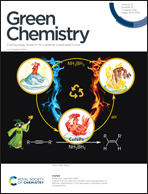Hydrodeoxygenation of C4–C6 sugar alcohols to diols or mono-alcohols with the retention of the carbon chain over a silica-supported tungsten oxide-modified platinum catalyst†
Abstract
The hydrodeoxygenation of erythritol, xylitol, and sorbitol was investigated over a Pt–WOx/SiO2 (4 wt% Pt, W/Pt = 0.25, molar ratio) catalyst. 1,4-Butanediol can be selectively produced with 51% yield (carbon based) by erythritol hydrodeoxygenation at 413 K, based on the selectivity over this catalyst toward the regioselective removal of the C–O bond in the –O–C–CH2OH structure. Because the catalyst is also active in the hydrodeoxygenation of other polyols to some extent but much less active in that of mono-alcohols, at higher temperature (453 K), mono-alcohols can be produced from sugar alcohols. A good total yield (59%) of pentanols can be obtained from xylitol, which is mainly converted to C2 + C3 products in the literature hydrogenolysis systems. It can be applied to the hydrodeoxygenation of other sugar alcohols to mono-alcohols with high yields as well, such as erythritol to butanols (74%) and sorbitol to hexanols (59%) with very small amounts of C–C bond cleavage products. The active site is suggested to be the Pt–WOx interfacial site, which is supported by the reaction and characterization results (TEM and XAFS). WOx/SiO2 selectively catalyzed the dehydration of xylitol to 1,4-anhydroxylitol, whereas Pt–WOx/SiO2 promoted the transformation of xylitol to pentanols with 1,3,5-pentanetriol as the main intermediate. Pre-calcination of the reused catalyst at 573 K is important to prevent coke formation and to improve the reusability.



 Please wait while we load your content...
Please wait while we load your content...